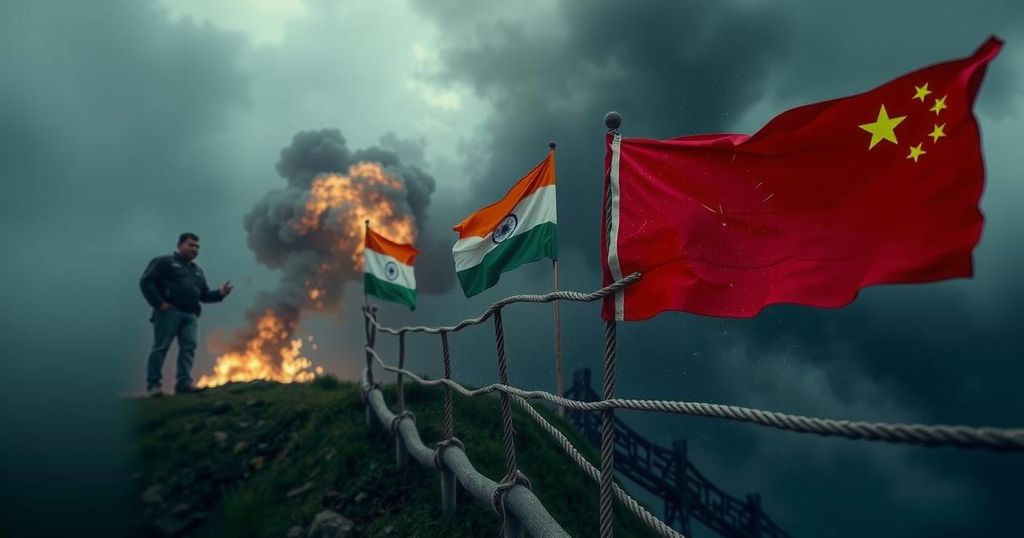Myanmar’s Unseen Civil War: A Critical Overview Amid Global Conflicts
The conflict in Myanmar, which began with a military coup in February 2021, has resulted in a brutal civil war overshadowed by conflicts in Ukraine and Israel. As the junta loses territory to rebel groups, the situation draws concern from neighboring countries, particularly China and India. The warfare has evolved to include advanced tactics like drone strikes, highlighting the complex and escalating nature of the ongoing crisis, which has significant implications for regional stability and international relations.
The ongoing conflicts in Ukraine and Israel have eclipsed the severe and escalating conflict in Myanmar, a Southeast Asian nation of 55 million, which has been embroiled in a civil war since February 2021. This conflict was ignited when the military junta overthrew the democratically elected government led by Aung San Suu Kyi, thus derailing Myanmar’s tentative steps toward democracy. The United Nations reports that the military, significantly backed by arms from Russia, has faced fierce resistance from local rebel groups, resulting in violent confrontations that have exacerbated existing ethnic divisions within the country. In a particularly noteworthy development, following recent aggressions from rebel forces, the junta lost control of crucial territories in Shan State near the Chinese border. This territorial loss not only reflects the growing capabilities and assertiveness of rebel factions but also has raised significant alarms among neighboring nations concerning the instability that could spill across borders. For instance, an attack on China’s consulate in Mandalay on October 18, 2023, highlights rising anti-China sentiment within Myanmar due to Beijing’s perceived favoritism toward the junta. Despite being seen as an ally and arms supplier for the regime, China’s role in Myanmar is complex. While China attempts to position itself as a mediator, it has maintained connections with various ethnic armed groups opposing the military. China’s stability is at stake due to its 2,200-kilometer border with Myanmar, prompting it to encourage negotiations between both warring sides. Moreover, China continues to invest heavily in Myanmar, with investments comprising approximately 25% of Myanmar’s total foreign investments, focusing on infrastructure and other critical sectors. The evolving nature of the conflict has increasingly involved modern warfare tactics, where both the military and insurgents are utilizing drones, transforming the battlefield. Analysts suggest that the Myanmar military is struggling to keep pace technologically, making it challenging for them to maintain control. experts argue that their aspiration for a complete military victory complicates the possibility of meaningful negotiations and peace. As Myanmar suffers, the implications extend to neighboring India, which is particularly concerned about stability in its northeastern states that share a border with Myanmar. The country has seen a rise in refugees fleeing the violence and instability, which further complicates an already delicate geopolitical situation. The crisis in Myanmar stands as a grave reminder that while the world focuses on more prominently reported conflicts, regional instabilities can have significant ramifications on global security and humanitarian situations.
The article discusses the civil war currently afflicting Myanmar, which has been largely overshadowed by other high-profile global conflicts, specifically the wars in Ukraine and Israel. Myanmar faces political upheaval, humanitarian crises, and economic collapse following a military coup in February 2021. The article explains the historical context of the conflict, the involvement of external powers such as China and Russia, and the implications of this instability for neighboring countries, particularly India.
In conclusion, while global attention is captured by the conflicts in Ukraine and Israel, Myanmar’s continuing civil war poses critical national and regional challenges. The internal strife, underpinned by international dynamics with powerful neighbors like China and India, warrants greater awareness and a comprehensive response from the international community. Myanmar’s crisis serves as a harbinger of the potential consequences that unchecked regional instability can inflict on global security. The urgent need for dialogue and strategic engagement remains paramount to avert larger humanitarian and geopolitical crises in Southeast Asia.
Original Source: www.eurasiantimes.com








Post Comment